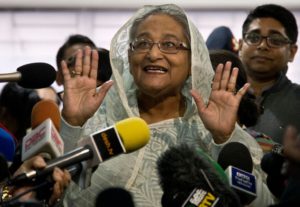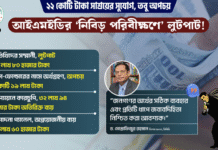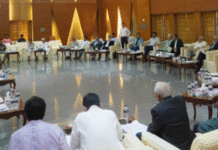WorldViews Analysis Washington Post
Why Bangladesh’s landslide election result is bad for its democracy

Bangladeshi Prime Minister Sheikh Hasina speaks to reporters after casting her vote in parliamentary elections in Dhaka, Bangladesh on Sunday. (Anupam Nath/AP)
By Joanna Slater and
Azad Majumder
December 31 at 8:32 AM
NEW DELHI — On Sunday, Bangladesh, the world’s eighth most populous country, held what was billed as its first competitive election in a decade.
But the results were anything but close: The incumbent prime minister, Sheikh Hasina, and her ruling coalition won 288 out of 300 seats in Parliament.
That kind of margin of victory — 96 percent — was a result one might expect in a place like North Korea, not a democratic nation such as Bangladesh.
That is exactly the problem: Hasina, Bangladesh’s increasingly authoritarian leader, consolidated her grip on power but at the cost of her own electoral legitimacy.
The opposition rejected the lopsided results. “We call upon the election commission to declare this farcical election void and demand a fresh election,” said Kamal Hossain, a respected lawyer and former member of Hasina’s Awami League party who headed an alliance of opposition parties.
This ad will end in 8 seconds
Election-related violence killed 17 people in Bangladesh on Dec. 30, a police spokesman said. (Reuters)
However, the chief election commissioner on Monday dismissed the demand for a new election. Instead, the results will pave the way for Hasina to continue her formula for maintaining power: strong economic growth coupled with repression of political opponents and critics of her government.
Hasina, 71, is the daughter of the founding president of Bangladesh, a Muslim-majority nation that gained its independence from Pakistan in a bloody conflict in 1971. Since 1991, the country has held democratic elections in which two parties — Hasina’s Awami League and the Bangladesh Nationalist Party (BNP) — have traded power.
Elections in Bangladesh are not peaceful affairs. Supporters of the two major parties commonly engage in street violence, and at least 17 people were killed Sunday, according to a police spokesman.
While most experts had predicted that Hasina would win the election, few expected a landslide of this magnitude. Hasina’s Awami League fared even better than it did in the last national poll in 2014, when the opposition boycotted the elections and many seats were contested by a single candidate.
ADVERTISING
There were scattered reports of irregularities at polling stations, including possible vote tampering, but observers said Hasina had used other means to tilt the field in her favor long before Sunday.
Opposition candidates said they had encountered violence, threats and harassment when they attempted to campaign; the BNP said a dozen of its candidates were arrested on spurious charges. In the capital, Dhaka, posters for opposition candidates were scarce.
Hasina rejected allegations of vote-rigging on Monday, telling reporters that she tried to ensure a free election and that she was surprised the opposition did not campaign more actively, according to Reuters.
Bangladesh’s voters, meanwhile, faced a difficult choice. Hasina has grown intolerant of dissent and shows no willingness to relinquish power, but she has presided over a buoyant economy and made significant progress in reducing poverty. She won praise for opening the country’s doors to Rohingya refugees fleeing persecution in Myanmar.
Hasina is also viewed by some — including in neighboring India — as an ally against the potential spread of Islamist extremism in Bangladesh.
The BNP, the main opposition party, is in disarray. Its leader, Khaleda Zia — Hasina’s former archrival — was imprisoned earlier this year on corruption charges. In October, her son, who lives in Britain, was sentenced to life in prison, along with 19 others, on charges of attempting to assassinate Hasina in 2004.
After Sunday’s election, Bangladesh has become a “one-party democracy,” wrote Kanchan Gupta, a political commentator in New Delhi. Hasina “faces no opposition worth its name.”
The sweeping nature of Hasina’s victory raises “serious doubt” about the fairness of the election, said Ataur Rahman, president of the Bangladesh Political Scientist Association. The opposition’s tiny number of seats also means there will be no mechanism for political accountability, he said.
Activists and journalists describe a climate of fear in which criticizing the government can have dangerous consequences. In September, Hasina’s government passed a new “digital security” act that imposes prison sentences on certain types of “propaganda,” a law that editors say cripples press freedom.
In Bangladesh, “the development story is an upward curve, and the democracy story is a downward curve,” said one longtime observer of the country’s elections, who spoke on the condition of anonymity because of the political climate in Bangladesh.
Shahidul Alam, a renowned photographer, was arrested in August and jailed for more than three months for allegedly making “provocative” statements about a wave of road-safety protests that swept Bangladesh last summer.
If “taking away one’s freedom is considered to be the biggest punishment one can give, then the entire nation is being punished constantly,” Alam said in a recent television interview. “That, surely, cannot be the price of development, or even the definition of development.”
Majumder reported from Dhaka.









